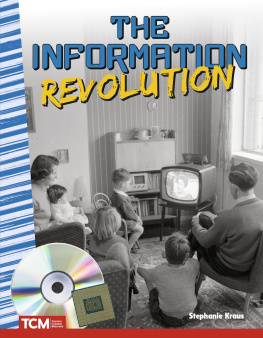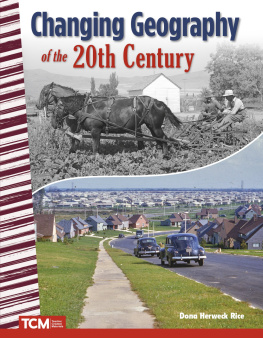
Consultant
Jennifer M. Lopez, NBCT, M.S.Ed.
Teacher SpecialistHistory/Social Studies
Office of Curriculum & Instruction
Norfolk Public Schools
Publishing Credits
Rachelle Cracchiolo, M.S.Ed., Publisher
Conni Medina, M.A.Ed., Editor in Chief
Emily R. Smith, M.A.Ed., Content Director
Vronique Bos, Creative Director
Robin Erickson, Art Director
Michelle Jovin, M.A., Associate Editor
Lee Aucoin, Senior Graphic Designer
Image Credits: front cover, p.1 Frank Martin/BIPs/Getty Images; p.5
(top) Internet Archive; p.5 (bottom) Paul Coulomb; p.6 Windell Oskay/
Flickr; p.7 (all) U.S. Army; p.8 AlisonW; p.9 Thomas Nguyen; p.10 (right)
NASA; p.11 Bettmann/Getty Images; p.12 (both) Andrew "FastLizard4"
Adams; p.13 (left) Jay L. Clendenin/Los Angeles Times via Getty Images;
p.14 (left) Roberto Brosan, George Segal (sculpture) for TIME; p.14
(right) secretlondon123/Flickr; p.16 (left) Museum of Applied Arts &
Sciences, Australia; pp.16?17 Sal Veder/AP Photo; p.17 (right) Raneko/
Flickr; p.18 Julie Deshaies/Shutterstock; p.19 (top) Doug Wilson/Corbis
via Getty Images; p.19 (bottom) Ruben de Rijcke; p.20 CERN/Science
Source; p.21 (right) Tim Berners-Lee for CERN; p.22 (left) FPS/Newscom;
p.22 (right) Tom Kelley Archive/iStock; p.23 Feature Photo Service/
Newscom; p.25 MailHamdi/Shutterstock; p.28 Ken Wolter/Shutterstock;
p.32 (right) Casimiro PT/Shutterstock; all other images from iStock and/
or Shutterstock.
Library of Congress Cataloging-in-Publication Data
Names: Kraus, Stephanie, author.
Title: The information revolution / Stephanie Kraus.
Description: First edition. | Huntington Beach : Teacher Created Materials,
2019. | Includes index. | Audience: Ages 7. | Audience: Grades 2-3. |
Summary: "Today, it's hard to imagine life without smartphones and the
internet. But those technologies weren't around 50 years ago. Between
1950 and 2001, the development of technology changed the world. Not only
did it revolutionize the way humans communicate and share information,
it changed the world's economy. This time became known as the
Information Revolution"-- Provided by publisher.
Identiers: LCCN 2019024412 (print) | LCCN 2019024413 (ebook) | ISBN
9781425850777 (paperback) | ISBN 9781425850777 (ebook)
Subjects: LCSH: Telecommunication--History--Juvenile literature. |
Information technology--History--Juvenile literature.
Classication: LCC TK5102.2 .K73 2019 (print) | LCC TK5102.2 (ebook) |
DDC 303.48/33--dc23
LC record available at https://lccn.loc.gov/2019024412
LC ebook record available at https://lccn.loc.gov/2019024413
All companies, websites, and products mentioned in this book are registered
trademarks of their respective owners or developers and are used in this book
strictly for editorial purposes. No commercial claim to their use is made by the
author or the publisher.
5301 Oceanus Drive
Huntington Beach, CA 92649-1030
www.tcmpub.com
2020 Teacher Created Materials, Inc.
ISBN 978-1-0876-5528-4

Table of Contents
Information at Our Fingertips ...........................
New Technology ..................................................
Apple, Windows, & the World Wide Web .....
Economic Growth .............................................
e Future of Technology ................................
Stage It! ...............................................................
Glossary ..............................................................
Index ...................................................................
Your Turn! ..........................................................

Information at
Our Fingertips
When was the last time you googled something? Did you
know that term didnt mean anything 20 years ago? Today, its
pretty common. It means we are able to look up the answer
to any question we have. All we have to do is go online. It
wasnt always this easy.
The first fully functional digital computer was invented
in 1946. Yet, home computers did not show up for another
30 years. Soon after, the internet took the world by storm.
People could have information at their fingertips. Then,
emails started being sent around the world. Instead of
sending a letter that would arrive in days or weeks, people
could write emails that arrived in seconds. People could buy
and sell goods easier and faster than ever before. These things
helped the world economy grow. New technologies were
created each year. Companies raced to come up with new
ideas first. The competition meant that companies had to
make things better, faster, and cheaper than everyone else.
Suddenly, people were getting information like never
before. People came up with a name for this erathe
Information Revolution.
People can have digital
doctors appointments.





















